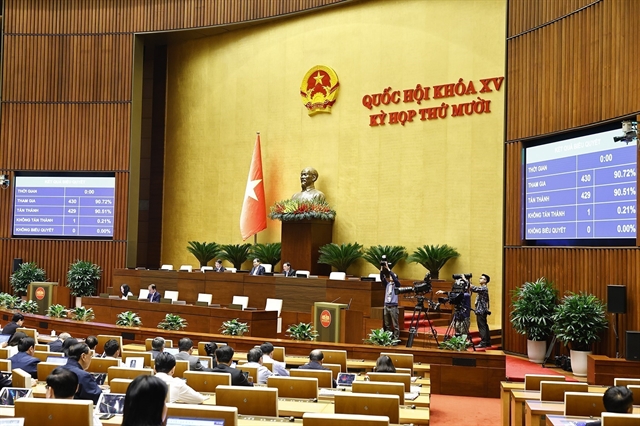 Politics & Law
Politics & Law


|
| The results of the voting for the passage of the Law on Mutual Judicial Assistance in Civil Matters at the National Assembly's 10th session on November 26. — VNA/VNS Photo |
HÀ NỘI — The 15th National Assembly (NA) on Wednesday adopted four laws: the Law on Extradition, the Law on the Transfer of Persons Serving Prison Sentences, the Law on Mutual Judicial Assistance in Civil Matters and the Law on Mutual Judicial Assistance in Criminal Matters.
With 426 out of 430 deputies present voting in favour (89.87 per cent), the NA passed the Law on Extradition, which consists of four chapters and 45 articles. It outlines principles, authority, conditions and procedures for extradition between Việt Nam and other countries, as well as the responsibilities of Vietnamese state agencies.
The law includes a separate provision on the temporary holding of a person in urgent circumstances prior to a formal extradition request.
Accordingly, where a foreign country requests Việt Nam to hold a person in urgent circumstances before submitting an extradition request under an international extradition treaty to which both Việt Nam and that country are parties, the Ministry of Public Security shall verify the validity of the request in accordance with that treaty.
If the request is deemed valid, the Ministry of Public Security shall immediately forward it to the competent police authority for a decision on holding the person and placing them in a designated holding facility as prescribed.
The duration of the holding measure and the required contents of the urgent request prior to an extradition request shall be implemented in line with the provisions of the relevant international treaty.
Where a foreign country requests that Việt Nam hold a person in urgent circumstances before an extradition request, but Việt Nam and that country are not both parties to an international extradition treaty, the Ministry of Public Security shall verify the validity of the request in accordance with domestic regulations.
The maximum duration of holding a person in urgent circumstances is 45 days from the date they are placed in the holding facility.
In the explanatory report submitted before the NA’s adoption of the draft, Chair of the NA’s Committee on Legal and Judicial Affairs Hoàng Thanh Tùng stated that some deputies proposed raising the minimum penalty threshold for extradition cases to offences punishable by at least two years’ imprisonment. They argued this would avoid wasting administrative resources on minor cases and reflect a more humane policy by limiting extradition to genuinely serious, socially dangerous offences.
However, the NA Standing Committee maintained that the draft law’s current threshold of at least one year’s imprisonment should remain. This standard carries over from the existing Law on Mutual Legal Assistance, aligns with international practice and Việt Nam’s extradition treaties, and helps ensure flexible, timely cooperation across a broader range of cases rather than only the most serious crimes.
The Law on the Transfer of Persons Serving Prison Sentences was approved with 429 out of 430 votes (90.51 per cent). Comprising four chapters and 48 articles, it stipulates the principles, authority, conditions and procedures for transferring prisoners between Việt Nam and other countries, as well as the responsibilities of Vietnamese state agencies.
Also gaining 429 out of 430 votes (90.51 per cent), the Law on Mutual Judicial Assistance in Civil Matters comprises four chapters with 38 articles. It regulates the principles, authority and procedures for mutual judicial assistance in civil matters between Việt Nam and other countries, and defines the responsibilities of Vietnamese agencies.
With support from 426 out of 427 deputies casting votes (89.87 per cent), the NA adopted the Law on Mutual Judicial Assistance in Criminal Matters. Comprising four chapters and 42 articles, the law stipulates the principles, authority and procedures for the activity between Việt Nam and other countries, as well as the responsibilities of Vietnamese authorities.
Mutual judicial assistance in criminal matters must respect independence, sovereignty, territorial integrity, non-interference in each other's internal affairs, equality and mutual benefit, and comply with the Vietnamese Constitution and laws along with relevant treaties, or be based on reciprocity where no treaty exists, with adherence to Vietnamese law and international law and practice.
All four laws will take effect on July 1, 2026. — VNA/VNS




